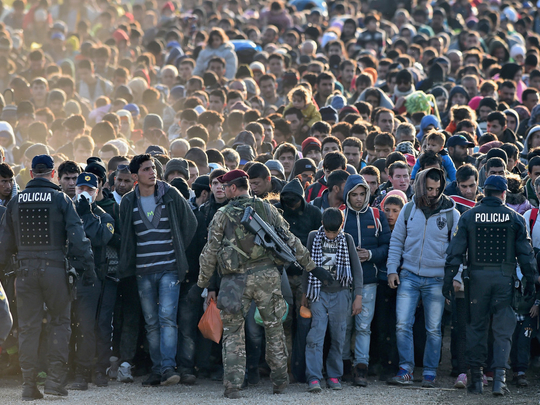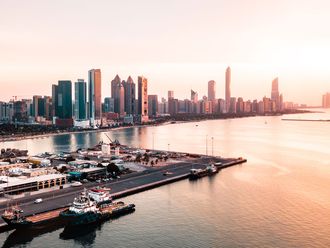
Last month’s massacre of 50 Muslims in consecutive shootings at two mosques in Christchurch, New Zealand, brought out many oft-ignored aspects to an increasingly globalised world that has intensified the traffic of immigrants.
On the one hand, increasing conflicts in some parts of the globe have given an impetus to the number of people seeking safe havens overseas. And on the other hand, the resistance by prospective host countries on pretexts ranging from outright prejudice and racism to popular fear of lost future economic opportunities often work to block incoming immigrants.
In the short term, the popularity gained by New Zealand Prime Minister Jacinda Ardern for her healing touch to the families and friends of the victims vividly highlighted the role of national leaders in facilitating the assimilation of newcomers. The widespread praise to her conduct easily put Ardern sharply in contrast to someone like US President Donald Trump who has chosen to build walls all around his country, from physical to conceptual and psychological on the pretext of securing America. For Trump, the powerful reality of present day globalisation notwithstanding, erecting barriers is the answer to many real or imaginary challenges for destinations of choice for immigrants.
A brief examination of the criteria used by host countries easily divides immigrants into three broad categories. They include family members of previous immigrants or naturalised citizens, individuals running from turmoil as refugees and immigrants armed with substantial wealth that enables them to practically buy out a new homeland. Each of these categories has often been the subject of debate. There is still no ideal answer to perfecting the policies that surround this often debated area. Yet, one very obvious gap from evidence provided by country after country shows how final integration of incoming immigrants has been a partial or near failure.
To be fair, integrating incoming prospective citizens from a vastly different culture, ethnicity and religion is hardly an easy choice. And yet, too often the focus from countries looking at prospective immigrants does not consider the medium to long term future of bringing in new future citizens. Under the third category which involves immigrants armed with substantial wealth who are judged solely on the basis of their investment muscle, the matter of integration almost never figures.
In the debate following the Christchurch attack, much has been written and said about the challenges surrounding not just Muslims in a country like New Zealand but also Muslim immigrants elsewhere. This has been a renewal of the debate that sharpened intensely in the wake of the New York terrorist attacks known as 9/11. There have been scores of incidents involving attacks by supremacists targeting either individual Muslims or groups of Muslims in various countries. The Christchurch attacks will long be remembered as the worst manifestation of this extremely sorry trend.
Two-way street
Going forward, integrating the newcomers into society while letting them enjoy their freedom to retain their identities will remain one of the biggest challenges for policymakers. It’s clear that the matter of integration must be a two-way street, built upon newly emerging communities of immigrants being as responsible for establishing bridges to their surrounding communities as it is for the native population to accept the newcomers.
Within this process, policymakers have a responsibility to create platforms that will help the eventual goal of creating social harmony. The choice of new immigrants as roughly outlined in the three categories must come in tandem with another vital consideration. For destination countries or host countries, it’s important to especially consider newcomers from areas that would help to improve the process of integration.
These range from individuals with expertise in the arts, culture and writing to religious scholars with a commitment to promoting unity. Too often, individuals from such backgrounds get left far behind the queue as governments focus on areas like unification of families, resettlement of victims of violence and last but not the least, individuals armed with substantial bank balances to begin a new life. While these areas are imperative in their own ways, it’s important to focus also on the final integration of new community members in new countries and new societies.
A wider community of individuals representing a broader spectrum from the arts, culture and religion should then give way to facilitating the entry of individuals from such backgrounds to the academia, the world of think tanks and religious institutions which are capable of interacting closely with like-minded institutions in host countries. For protection of mosques and religious institutions, it’s not only vital to provide them with protection from the police and the security community. It’s also essential for the guardians of such forums to interact with people and institutions from other faiths — be it Christianity or Judaism or any other religion to promote harmony.
Ultimately, a more integrated immigrants’ community in countries of destination will provide a more secure environment against future prejudice that in the worst incident could repeat another blatant incident of violence.
As for the world of today, populists will not succeed in changing this important fundamental reality. Immigrants are shown to have made rich economic contribution to their adopted countries. Across the US, the long-term services of foreign nationals ranging from farm workers to more qualified individuals will be tough to ignore.
Farhan Bokhari is a Pakistan-based commentator who writes on political and economic matters.










